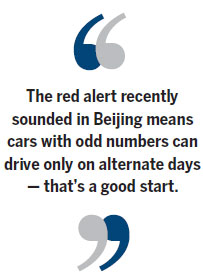In 1952, thousands died in Britain's capital as unrestricted pollution combined with a temperature inversion
Londoners looking at pictures of masked Beijing residents groping their way through foul-colored smog so thick you can't see across Tian'amen Square will feel both sympathy and a sense of familiar for the climatic conditions - 63 years ago upwards of 6,000 people died when a combination of factors triggered what locals here call a peasouper.
London's smog was a disastrous mixture of an unseasonal anticyclone, cold and snowy weather, post-war austerity, unchecked factory emissions and houses built during the Victorian era.
Let me explain, if I can.
In the aftermath of World War II Britain was weary, tired and broke. All the finest quality Welsh coal had to go for export to raise much-needed foreign exchange to pay bills incurred during the fight against fascism. The fact that most dwellings in this country were Victorian or Edwardian, in other words very old, meant that they were heated by open fires, and double-glazing with central heating was something our rich American and Canadian cousins had.

All Londoners could afford was poor quality "brown coal", which spat and sputtered in the grate and smoked furiously.
London's great iconic multi-chimney power stations at Battersea, Wandsworth and Bankside all spewed vast columns of pollutants into the atmosphere as they struggled to cope with the increased demand for electricity to cover the winter months.
Buses and trucks burning badly refined diesel added to the nightmare conditions.
And to cap it all, literally, an anticyclone sat over London, leaving a cap of cold air which warmed as it descended. There were no winds to carry away the pollutants. Scientists call this an inversion - the man in the street called it a nightmare. Hollywood would probably call it the Perfect Storm.
Policemen had to walk in front of buses and pedestrians blundered around as visibility was reduced to mere feet in some places. Vertically, the smog was as much as 200 meters deep.
Historically, London had always suffered from thick fogs around November, surrounded as it is by high ground north and south with the River Thames meandering through from east to west.
As Britain industrialized, factories added to the mess. There was little or no legislation to cover emissions.
So how did this all end?

Well, Parliament passed the Clean Air Act in 1962, which in effect banned the burning of coal in London and encouraged the use of coke, a byproduct of the steel industry, which gives off very little emissions and burns far longer, although less warmly, than raw coal.
You can't, these days, have a bonfire in your back garden as a result of the Clean Air Act.
Other developments helped. As Britons became more prosperous, double-glazing and gas powered central heating became the norm, meaning homes retained their heat much more, and it was generated in a more efficient way.
Smoke-belching factories were banned within the central area of London, and the great Thames-side power stations were replaced by the National Grid carrying power all over the country.
So what lessons are there in all of this for China, Beijing in particular?
Weather is always going to be an issue, but as Londoners learnt, there are ways to lessen the impact.
Control of factories is the most obvious. Making sure they are moved well away from the center is one thing, but insisting on high-tech solutions to the issue of pollutants is another.
Coal as a heating material has to go. Other, less noxious fuels must be developed. Britain, faced with calamity, developed so-called smokeless fuel as a stop-gap whilst central heating and double-glazing became the norm.
Car ownership by the masses came late to China as people's incomes rose, but some control must be exercised over the number of cars on the road at any one time.
The red alert recently sounded in Beijing means cars with odd numbers can drive only on alternate days - that's a good start.
Green spaces absorb CO2 emissions, with trees acting as nature's filters.
Many believe that London's wonderful array of parks, from Hampstead Heath in the north, via Regents Park, Hyde Park, St. James's Park and the myriad squares and gardens in between, have all helped London recover from the horrors of the peasouper era.
Right now in London, it's an offense in law to chop down a tree, even in your own backyard.
So, more green spaces, move the factories, cut back on cars and encourage electric vehicles.
One thing China can't do is control the weather. Yet.
The author is managing editor of China Daily Europe, based in London. Contact the writer at chris@mail.chinadailyuk.com